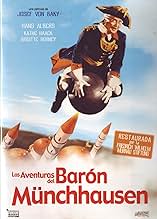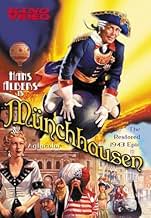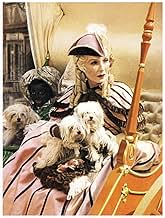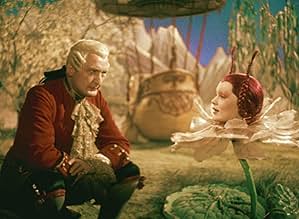This lavish, impudent, adult fairy tale takes the viewer from 18th-century Braunschweig to St. Petersburg, Constantinople, Venice, and then to the moon using ingenious special effects, stunn... Read allThis lavish, impudent, adult fairy tale takes the viewer from 18th-century Braunschweig to St. Petersburg, Constantinople, Venice, and then to the moon using ingenious special effects, stunning location shooting.This lavish, impudent, adult fairy tale takes the viewer from 18th-century Braunschweig to St. Petersburg, Constantinople, Venice, and then to the moon using ingenious special effects, stunning location shooting.
- Director
- Writers
- Stars
- Awards
- 1 nomination total
- Director
- Writers
- All cast & crew
- Production, box office & more at IMDbPro
Featured reviews
Acclaimed director Terry Gilliam of Monty Python and 12 Monkey's fame, obviously tried to draw more attention to this striking wonder when he made his own version of this tale 'The Adventures Of Baron Munchausen' in 1988. If it wasn't for Mr.Gilliam, I probably would have never bothered to even watch this film. So I owe him many thanks as Münchhausen has easily become one of my all time favorite films. The pace, humour, and sheer originality of this fantasy make it one of the easiest subtitled films to watch in existence, period. It ranks up there with the greatest pre-1950's films such as The Treasure Of The Sierra Madre, and Chaplin's brilliant City Lights. If you love movies, if you love classic cinema, if you love original fantasy films, if you love humorous films; Seek out 1943's Münchhausen whatever you do. It will not disappoint. This film is certainly not for children. However, in terms of flat out fantasy entertainment, I would say that this nearly 70 year old antique blows away Peter Jackson's Lord Of The Rings films any day, and easily. Enough said.
9/10
It is filmed in colour and - despite being produced during WWII - no expense had been spared on the lavish sets and costumes. But this is not what this film is all about. As in Gilliam's film, this Münchhausen is a magical character, but it is not the magic you find in a modern animated Walt Disney spectacle, it is a magic with a dark side, a magic that can threaten and seduce and corrupt. Münchhausen himself comes across as an ambiguous character, charismatic and heroic, but by no means cuddly and lovable.
As a result this is more a fairy tale for adults than one for children, and the full original version with nude harem girls, sexual innuendo, etc. wouldn't have passed the American censors of its day and probably still get an R rating today.
Extremely funny and hilariously entertaining, Josef von Baky created an unusual and highly original odyssey through Europe, of a man pursuing the exciting and adventurous. Those who have read the stories, know that some of Munchhausen's more famous deeds include his ride on the cannonball, tying his horse to the tip of a church tower and breaking into the ice, out of which he pulls himself by his own hairs. The first one mentioned can be found in the movie, as well as other humorous scenes, that perfectly fit into the Munchausen concept. Munchhausen lived at the end of the 18th century in Brunswick, but he always traveled around Europe with his loyal servant Christian Kuchenreuter. The story starts out with Munchhausen returning from one of his several trips to his residence in Bodenwerder, where all the jackets in his cabinet get rabies and Christian introduces a fascinating substance, that makes a man's beard grow in a matter of seconds. Hours later, Munchausen leaves for the court of Prince Anton Ulrich of Brunswick, who is commanded to leave for St. Petersburg, and would like Munchhausen to accompany him. On their way to Russia, Munchhausen and Christian encounter the dark Count Cagliostro, who is wanted all over Europe for performing notorious witchcraft. He plainly tells Munchhausen of his intentions to become count of the Courland, and asks Munchhausen to assist him, which he denies, by telling him that he has absolutely no intention of reigning. In St. Petersburg, he meets Katharina the Great and the two become lovers, and he also meets Cagliostro again, and warns him that Katharina intends to arrest him. Out of gratitude, Cagliostro gives Munchausen a ring that makes him invisible and the ultimate gift of eternal youth, as long as Munchhausen wants it.
Baron Munchhausen was never very complex in the original stories, as they mostly focused on his fairy tales, rather than the vast and interesting personality. But here, the man is a very deep and powerful character, who sees people die around him, while he possesses the gift of eternal life, and becomes more and more torn between his desire for adventure and that to share a mortal life with his friends and loved ones. For this movie the basic concept of the Munchhausen stories was changed a bit, with the film being somewhat of a life story, even though there is no real linear plot, with the narrative reminding more of episodes. While a lot of the film is actually more of a historical drama than fantasy, many scenes will bring you into the wonderful world of Baron Munchhausen, including the cream that makes your hair grow in a matter of seconds, the rifle that can shoot accurately for hundreds of miles and the ride to the moon in an air balloon. An exemplary tale of imagination and creative adventures, Munchhausen's visual effects can't measure up the ones of today, of course, but in perspective to the times, they are absolutely stunning.
Some of the acting in this movie really stands out, even though it mostly centers around the colorful sets. Hans Albers makes the perfect Baron Munchhausen, a witty, intelligent, charismatic and very deep character, who is not the perfect hero, but a man who goes through life trying to have it as exciting as possible. Whether he's deeply philosophical, in the middle of one of his fun adventures, or once again seducing a beautiful woman, Albers is extremely convincing as the flawed, but good-hearted Munchhausen, who learns a lot during his life, enough to choose mortality over eternal life at the end. The film features a huge ensemble of characters, and many of them are just part of one episodes in Munchhausen's life. Hermann Speelmans, who plays Munchhausen's loyal servant and friend Christian Kuchenreuter, was also an exemplary casting choice, and manages to be funny (growing his beard in a matter of seconds) and very emotional (rapid aging on the moon) in a number of scenes. Another performer who really stands out is Ferdinand Marian, as the mysterious Count Cagliostro, who is very power-hungry, self-serving, but in the end a thankful and appreciative man, who rewards Munchhausen for warning him by giving him the eternal youth. Brigitte Horney as Katharina the Great is also great in her role, as the proud monarch, who is completely charmed by Munchhausen.
Another thing that might shock you is the nudity in this movie, that wouldn't get past any US-censor these days, as well as some pretty explicit sexual jokes. Therefore, "Munchhausen" really is a fairy tale for adults and not necessarily for children.
What's left to say, is that "Munchhausen" is a beautiful tale of adventures and imagination, that is an impressive document of what Germany's film industry was able to conjure in the 1940s already. And when Hans Albers rides on the cannon ball, turns his head to the audience, and takes off his hat in greeting, you will completely be captured by his charismatic and smart personality that brings the magic to this outstanding movie.
Revisiting the movie now, as a euphemistically labeled "senior citizen," I was surprised that it holds up quite well. It amuses, it surprises, it is well acted, the dialog is clever, written after all by the famous novelist Erich Kästner under a pseudonym to cover up the fact that the Nazis saw themselves forced to employ him after burning his books.
There is something quite disturbing in hindsight about this movie. Why was it made? It was released in the year between the Battle of Stalingrad and the Allied Normandy Invasion the two events that were to seal Germany's fate. Was it an attempt to sustain both at home and abroad the far-fetched illusion that the war was going so well that all the German people cared about was laughing at the Baron Münchhausen's lies? Or was it an attempt at showing that Babelsberg could produce a grand spectacle just as well as Hollywood? And if a spectacle was being offered, why, in a country in which mass murder and deception were the order of the day, was even the hero to be a liar?
I am asking these questions because much in this movie is disturbing for reasons related to them. Take the Baron himself, played in this movie by Hans Albers, the greatest star, the Clark Gable of German movies in those years, yet by the time of this movie a man in his fifties pretending to be irresistible to females. It is as if MGM had cast an aging Adolphe Menjou as Rhett Butler in "Gone With the Wind." Now Albers is a fine actor, but to enjoy the movie you definitely have to suspend disbelief and pretend that the aging actor riding the cannonball is not bothered by arthritic pain.
The sets look more like cheap nouveau-riche furnishings and the costumes are cut from wartime stock. Ilse Werner, as Princess Isabella d'Este, is as beautiful as ever, and as Count Cagliostro we get to see Ferdinand Marian, the actor who just a few years earlier had disgraced himself by playing the lead in "Jud Süss," the most disgusting anti-Semitic propaganda film ever made, a fact that ultimately led Marian to alcoholism and a DUI death at war's end, considered a suicide by many.
Now, one can say, let's just watch the film for what it is, and not in its historic context. But then, Marian's acting of Cagliostro, a swindler, is crafted with the same mannerisms he used in creating the Jew Süss. In short, the undeniable artistic qualities of this movie are infected with the severe moral deficiencies of its makers, and this surprisingly renders the movie more interesting than it has any right of being. This is what disturbs me.
Did you know
- TriviaWriter Erich Kästner is widely reported to be billed as "Berthold Bürger" on this film, but there is in fact no writing credit at all. Kästner was a banned author in Nazi Germany and his books were among those burnt in 1933, which was the reason for the lack of writing credit here. Joseph Goebbels gave Kästner only a special permission to write a script, on which the author was actually named as Berthold Bürger. However he also give instruction to the German press never to mention the real author of the script nor to mention the name Berthold Bürger. Therefore no writing credits in the movie was used.
- GoofsSophia's "beauty spots" disappear and reappear during the opening scenes of the film.
- Quotes
Doge: I'm glad the balloon is to launch in Venice -- it will advance the cause of science, and provide entertainment for the people. The art of the statesman is, by doing one thing, to achieve two goals.
François Blanchard: I serve only science, your Excellency.
Doge: Of course, it's best for you to believe that. Let no one convince you otherwise.
- Alternate versionsThe length of this film when submitted to the Film Review Office in March 1943, according to the Deutsches Filminstitut, was originally 134 minutes (or 3662 meters). This version was used for the premiere of the film at the Ufa-Palast am Zoo. Three months later, a second version (the general release version) was submitted, cut down to 118 minutes (3225 meters). After the war, the next version (December 1949) was 105 minutes, the 1954 version 101 minutes, the version for general audiences (shown that year) 88 minutes. In 1995, a first restoration was assembled by the F.W. Murnau Foundation, clocking in at 114 minutes. In 2017, a 35mm Agfacolor print was discovered at the Gosfilmofond of Russia. That print, which runs 131m (3590m), was restored and used for the 2019 Blu-ray release.
- ConnectionsFeatured in Et l'Angleterre sera détruite (1967)
- How long is The Adventures of Baron Munchausen?Powered by Alexa
Details
- Release date
- Country of origin
- Language
- Also known as
- The Adventures of Baron Munchausen
- Filming locations
- Berlin, Germany(environs)
- Production company
- See more company credits at IMDbPro
- Runtime
- 1h 50m(110 min)
- Sound mix
- Aspect ratio
- 1.37 : 1

































